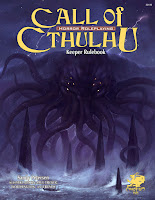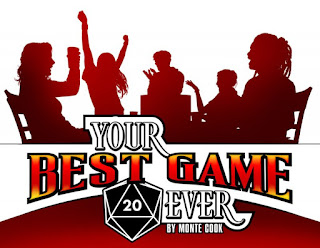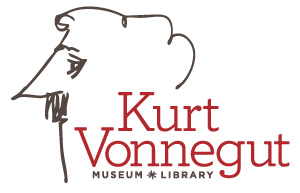 | |
What's the difference between Delta Green (DG) and Call of Cthulhu 7th Edition (CoC)?
Setting and Atmosphere
DG: ModernIf Scully and Mulder worked for the Smoking Man.
CoC: Default 1920s
Being stuck in a H.P. Lovecraft story.
Commentary: Modern is very accessible, whereas 1920s is harder for new players to get into since it's before their time. Though, CoC has rules for Dark Ages, Roman Invictus, Westerns, Victorian Gaslight, and Pulp 1930s.
Characters
DG: Generally law enforcement officials or someone working for the government.CoC: Normal everyday people from all walks of life.
Commentary: DG assumes you are competent and are trained and are willing to face down horrors. CoC assumes that you are just a normal Joe who runs into something horrible and will run away screaming. Though eventually, you'll learn to become an Investigator who fights the good fight.
DG is still using the old raw Characteristics (CoC 6th Ed) / Statistics (DG) scores and generally requires a STAT x 5 for die rolls.
Bonds and Backstories
DG: Characters have bonds that represent their home life, like their spouse, ex-spouse, children, parents, friends, co-workers. You can reduce SAN loss by Projection, where you damage your bonds as you take out your frustrations from work into your home life.CoC: Characters have attachments to significant people, places, or things. They can spend quality time with significata to regain SAN.
Commentary: I love Projection in DG and how it models the stereotypical cop whose family life has gone down the drain because he spends too much time at work and can't talk about the serial killer or the gruesome crime scene with his loved ones. Two different approaches here and DG definitely has gone with grimdark.
Insanity
DG: Has split up threats to SAN into Violence, Helplessness, and Unnatural. And you can harden yourself to Violence and Helplessness. A 5 point SAN loss causes Temporary Insanity which results in a Fight, Flight, or Freeze decision. There's also a Breaking Point. If your SAN hits the Breaking Point, you get a psychological disorder.CoC: A 5 point SAN loss has a chance of Temporary Insanity, the result can be from a random chart. If you lose 20% of your SAN during a game day, you get an Indefinite Insanity.
Commentary: I like DGs 3 threats to SAN. DG's Breaking Point and CoC's Indefinite Insanity are pretty similar. DG's Temporary Insanity does let you game the system a little. Whereas CoC's Temporary Insanity goes to a random chart. I have a variant for convention play, if multiple PCs go Temporary Insane, I make each throw a Fight / Flight / Freeze card into a hat, then mix it up, and then deal them out randomly, but one table outsmarted me and all agreed to Fight before putting their cards in. 😎
Unnatural and Cthulhu Mythos
DG: Unnatural Skill is knowledge about anything not natural such as the Cthulhu Mythos.
CoC: Cthulhu Mythos Skill is knowledge about "that which man is not meant to know."
Commentary: They're the same thing.
Levels of Success
DG: Critical Success > Success > Failure > Fumble.In Delta Green, if you roll doubles with your percentile dice (11%, 22%, 33%, ... 88%, 99%, 100%), it's either a Critical Success or Fumble. A Critical Success if it's equal or below your skill %, a Fumble if it's above your skill %. A special exception is 01% which is always a Critical Success. If it's a contested roll, compare levels of success. If there's a tie in level, whoever rolls highest with a success wins. e.g. a Success roll of 48 > Success roll of 12.
Also Delta Green uses a mechanic similar to Trail of Cthulhu. Depending on how the scenario is written (in one scenario a 30% in Computer Use was all that was needed for an automatic success), if your skill % is considered sufficient, no die roll is needed, it is considered an automatic success.
CoC: Critical Success > Extreme Success > Hard Success > Regular Success > Failure > Critical Failure.
Roll 01 = Critical Success. Roll below or equal to 1/5 skill % = Extreme Success. Roll below or equal to 1/2 skill % = Hard Success. Roll below or equal to skill % = Regular Success. Roll over skill % = failure. Roll 100 = Critical Failure or if skill is equal or greater than 50%. Roll 96-100 = Critical Failure if skill is < 50%.
If it's a contested roll, just compare levels of success. If there's a tie in level, then compare the skill %, higher skill % wins. e.g. two guys are racing cars. First guy has driving at 60% and the 2nd guy has it at 20%. First guy rolls 28 = Hard Success. 2nd guy rolls 8 = Hard Success. 60% > 20%, so 1st guy barely beats out the 2nd guy.
Commentary: The beta test of CoC used to use the same method as DG, comparing the highest successful roll, but when I play tested it, people kept on picking up their dice. They just remembered that they succeeded and the level of success, but not what they rolled. Between the two, I'd say they're about the same, but given the propensity of people to pick up their dice after rolling, I'd give CoC the edge. But if you're running online with a robotic dice roller, you can examine the die rolls afterwards.
CoC: Added a bonus die or penalty die for each advantage or disadvantage up to a max of 2 bonus or penalty die. If you have an advantage of some sort, you'd get to roll an extra 10's die and take the best die roll. e.g. Roll two 10's die and get a 50 and a 20. The 1's die is an 8. So, the choice is 58 or 28. Taking the best roll, 28.
Commentary: People get confused about the CoC bonus die until you show them how it works, then it's ok. The math for the bonus and penalty die are a bit complicated and hard to get a gut feeling for. And it is used frequently when shooting multiple bullets. Basically, if you have a very high firearm skill % (60% or higher), it's worth taking multiple shots and having a penalty die, otherwise you should just do single shots. I like rolling extra dice, it's fun, but for simplicity's sake, DG makes it easy to understand. So, the edge goes to DG.
CoC: Critical Success > Extreme Success > Hard Success > Regular Success > Failure > Critical Failure.
Roll 01 = Critical Success. Roll below or equal to 1/5 skill % = Extreme Success. Roll below or equal to 1/2 skill % = Hard Success. Roll below or equal to skill % = Regular Success. Roll over skill % = failure. Roll 100 = Critical Failure or if skill is equal or greater than 50%. Roll 96-100 = Critical Failure if skill is < 50%.
If it's a contested roll, just compare levels of success. If there's a tie in level, then compare the skill %, higher skill % wins. e.g. two guys are racing cars. First guy has driving at 60% and the 2nd guy has it at 20%. First guy rolls 28 = Hard Success. 2nd guy rolls 8 = Hard Success. 60% > 20%, so 1st guy barely beats out the 2nd guy.
Commentary: The beta test of CoC used to use the same method as DG, comparing the highest successful roll, but when I play tested it, people kept on picking up their dice. They just remembered that they succeeded and the level of success, but not what they rolled. Between the two, I'd say they're about the same, but given the propensity of people to pick up their dice after rolling, I'd give CoC the edge. But if you're running online with a robotic dice roller, you can examine the die rolls afterwards.
Advantages / Disadvantages
DG: Stayed with the old style of +/- 20%, +/-40% for each advantage/disadvantage. If you have an advantage of some sort, you'd get +20% to your skill roll.CoC: Added a bonus die or penalty die for each advantage or disadvantage up to a max of 2 bonus or penalty die. If you have an advantage of some sort, you'd get to roll an extra 10's die and take the best die roll. e.g. Roll two 10's die and get a 50 and a 20. The 1's die is an 8. So, the choice is 58 or 28. Taking the best roll, 28.
Commentary: People get confused about the CoC bonus die until you show them how it works, then it's ok. The math for the bonus and penalty die are a bit complicated and hard to get a gut feeling for. And it is used frequently when shooting multiple bullets. Basically, if you have a very high firearm skill % (60% or higher), it's worth taking multiple shots and having a penalty die, otherwise you should just do single shots. I like rolling extra dice, it's fun, but for simplicity's sake, DG makes it easy to understand. So, the edge goes to DG.
Hand-to-Hand Combat - Defending
DG: You can either Dodge, Fight Back, or Do Nothing. If you haven't acted, you may Dodge or Fight Back an attack, and all subsequent attacks, against you that round; this will count as your action. Dodge works against all hand-to-hand and range attacks (if there is cover). Fight Back only works against hand-to-hand, not range attacks. Compare levels of success, highest level of success wins. Dodge success means defender is missed. Fight Back success means your offensive action succeeds against the attacker instead of being hit. The only reason to Dodge is if you're being shot at, otherwise I see no reason to Dodge (unless you have a much higher Dodge than Combat skill). If you already acted or want to do something else on your action such as run away, you'll have to Do Nothing and hope the attacker misses. It does seem unfair that if you act first (highest DEX) and attacked with hand-to-hand, you lose your ability to fight back, so I do allow you to Fight Back for the rest of the round even though you've acted.CoC: You can decide to Dodge or Fight Back against every hand-to-hand attack against you. You can decide on an attack by attack basis. The difference is on level of success. Dodge: If you meet or beat the level of success of your attacker you Dodge the attack. Fight Back: If you beat the level of success of your attacker, you do regular damage to your attacker instead of being hit. You can Dive for Cover against guns (p.113 Keeper Rulebook), but that actually takes your action or future action (if you've already acted that round), and it only gives your attacker a penalty die, if you succeed.
Commentary: I prefer CoC. It's easier to keep track of. And you can mix and match Dodge and Fight Back during combat.
Automatic Weapons and Explosives
DG: Added a Lethality % to various weapons. Instead of regular weapon damage, you roll % dice for each target. If you roll the Lethality %, it's an instant kill. If you don't, just add the two digits together. e.g. Roll 58 (missed the 10% Lethality), so damage is 5 + 8 = 13 pts damage. So basically, every mass damage weapon defaults to 2d10 damage, and sometimes it'll just kill you outright. Most people have about 11 hit points, and the average damage of 2d10 is 11, so on average it'll kill you anyway.CoC: Added a crazy math problem where you figure out how many bullets are in a volley, each additional volley gets a penalty die to hit, and how well you succeed determines how many bullets hit.
Commentary: DG wins hands down. For CoC, I use my own house rule for automatic weapons. For my house rule look for Machine Guns topic here: CoC 7th - Tricks of the Trade for Beginner GMs.
Luck and Pushing
DG: Luck is just 50%. But Critical Successes and Fumbles can happen.No such thing as Pushing, but if a skill % is high enough, you can get an automatic success, based on how a scenario is written or GM largesse.
CoC: Luck is a stat (3d6 x 5%) and optional rules let you spend luck to improve die rolls.
PCs can try a different tactic (original Intimidate failed, now try Fast Talk) or retry a skill by Pushing. This allows a reroll, but on failure, the result would be a Critical Failure which is discussed beforehand, before the roll. Once the stakes are decided on, the PC can decide to Push or not.
Commentary: I like spending Luck and having people with different levels of Luck. So, I prefer CoC's Luck rules vs DG's straight coin toss. Pushing is also a great rule change that ups the ante.
Skill Advancement
DG: Check the checkbox next to your skill when you fail. At the end of the scenario, gain 1d4 in that skill. It was originally 1%, but it was changed to 1d4. Errata (Agent's Handbook, Improving Skills).CoC: Check the checkbox next to your skill when you succeed (if you didn't use a Bonus Die or Luck spend). At the end of the scenario, roll % dice. If you fail, gain 1d10 skill points in that skill.
Commentary: Assume you have a skill at 50% and used it only once per scenario. In CoC, after 10 scenarios, on average you'd gain +13.75% in that skill (10 * 50% * 50% * 5.5 = 13.75). In DG, you'd gain +12.5% (10 * 50% * 2.5 = 12.5). And surviving 10 scenarios in a DG or CoC game is a feat in itself.
That makes them pretty similar, then the question is whether you want PCs to try skills they're good or bad at. CoC awards you for succeeding, so if you're going to metagame the system, try skills you're good at. DG awards you for failing, so if you're going to metagame the system, try skills you're bad at.
But in practice, PCs will try their best skill and only try a weaker skill when push comes to shove. DG does award a PC with a booby prize of 1d4 skill points when they fail a skill roll. In CoC, when a PC gets a miracle success, for a skill they have a base chance in, they generally will increase that skill.
The Books
DG: Agent's Handbook is needed for Character Creation and the Game Rules.Handler's Guide does not have the Game Rules, but has the History and World of Delta Green, including the Unnatural.
CoC: Investigator Handbook is needed for Character Creation, Investigator Organizations that a PC might be part of, and History of 1920s, but no Game Rules.
Keeper Rulebook has Game Rules and Character Creation, Monsters, Eldritch Tomes and Spells, and Alien Artifacts.
Commentary: To play DG, you only need the Agent's Handbook. To play CoC, you only need the Keeper Rulebook.
Summary
Commentary: For me it's a toss up. I'll play either.
























